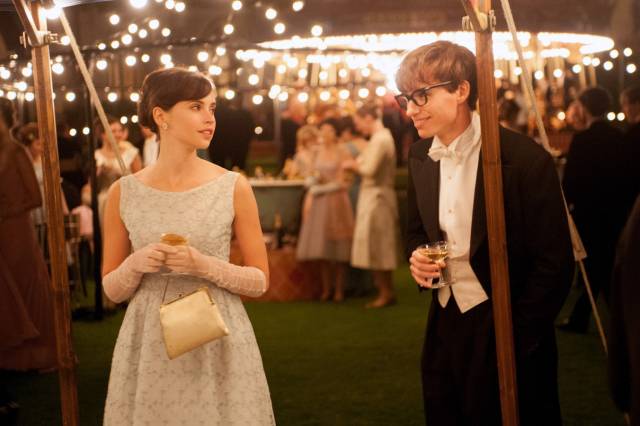
 The truly wonderful thing about James Marsh’s The Theory of Everything is that, despite its title, it’s actually rather efficient at pinpointing exactly the one specific thing it wants to concentrate on in its subjects' lives, and unlike most biopics, it doesn’t try to cram a person’s entire life in less than two hours. The subjects of the film are renowned physicist Stephen Hawking (Eddie Redmayne) and his first wife Jane (Felicity Jones), who met when they were both students at Cambridge. Hawking has become notorious for his complex theories on the origins of the universe and fortunately the film doesn’t try to make sense of them. We only know they’re important because we see other people’s eyes and grins grow with excitement, as he explains what all the numbers he’s scribbled mean.
The truly wonderful thing about James Marsh’s The Theory of Everything is that, despite its title, it’s actually rather efficient at pinpointing exactly the one specific thing it wants to concentrate on in its subjects' lives, and unlike most biopics, it doesn’t try to cram a person’s entire life in less than two hours. The subjects of the film are renowned physicist Stephen Hawking (Eddie Redmayne) and his first wife Jane (Felicity Jones), who met when they were both students at Cambridge. Hawking has become notorious for his complex theories on the origins of the universe and fortunately the film doesn’t try to make sense of them. We only know they’re important because we see other people’s eyes and grins grow with excitement, as he explains what all the numbers he’s scribbled mean.
Instead what the film does beautifully is tell the story of how these two people fell in love, struggled to stay together as Hawking’s neurodegenerative disorder made their life harder, and how despite all this they overcame adversity only to realize they were no longer in love. In very simple terms, it’s a film for adults. Despite the Instagram-like blurry sepias of its palette, and the undeniable beautification of its two leads (Jones looks as stunning as Julie Christie in Darling and Redmayne always looks like a Burberry model), it’s a film that doesn’t tend to overly romanticize the idea of love, in fact it’s the very nature of doubt that first attracts Jane to Stephen. How he, a strict man of science, can be so fascinated by a woman who lives in the ethereal realm of divinity, and how she, a churchgoer can love a man who thinks of god as an endangered species.
The film challenges them, and us, to find their worth beyond the surface, to see past our own prejudices and develop empathy and most important of all: acceptance. It gives us a glimpse into the revolutionary sexual freedom of the 1970s, practically borrowing a subplot from Lars Von Trier’s Breaking the Waves (featuring an unforgettable Charlie Cox as Jane’s platonic paramour), at times, it seems to lean more towards an emotional pragmatism, as it makes us wonder if science isn’t a way of evading the fact that we might just never be able to come up with formulas that define the nature of love. The Theory of Everything alludes to feminism and agnosticism, without specifically being a film about faith vs. science, or even men vs. women, and as such it proves to be a small miracle of its own.